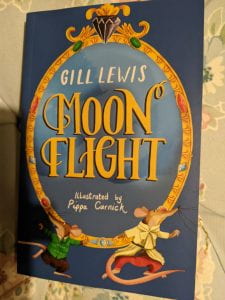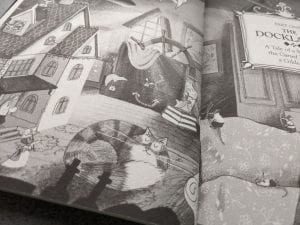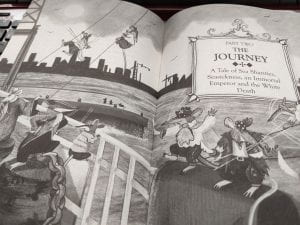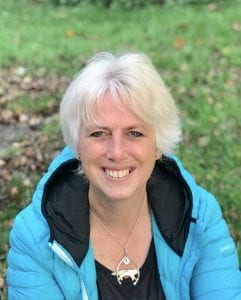As a fan of books by Gill Lewis, I was delighted to be asked to take part in this blog tour. The book itself is a fabulous tale of adventure and overcoming the limits that are placed on us (often by those who love us best). Thank you so much to Gill for agreeing to answer these questions for me and many thanks to everyone at David Fickling books for publishing the book and asking me to be involved.
- Moonflight is a very different story to those that we often associate with you. Have you always wanted to write this type of book and if so, have other authors been an influence on this?
My other stories are very grounded in the real world and are often about conservation with the human characters telling the story. I ventured into anthropomorphism with A Street Dog Named Pup, but Pup does live essentially as a dog in the modern human world. I suppose as a writer one can get pigeonholed into one genre, but I think most writers have a variety of stories they want to tell. I did enjoy being released from detailed factual research and building the world of the highly anthropomorphised Dockland Rats.
writers have a variety of stories they want to tell. I did enjoy being released from detailed factual research and building the world of the highly anthropomorphised Dockland Rats.
As a child, the stories I wrote were about small people or animals having adventures, and it has been wonderful to immerse myself in these worlds again. I have always enjoyed stories such as Despereaux by Kate Di Camillo and the world of the mice she created. As a child I loved Paul Gallico’s book Jennie, about a boy transformed into a cat after a car accident. I also love the Disney films of The Rescuers. I think children can relate to small creatures being the heroes of the story.
- What gave you the idea for a hero who was so restricted in his lifestyle? Did lockdown have any impact on your thought process?
Lockdown had a huge impact. I was lucky that we had a big garden and access to local walks, but our lifestyles were so restricted in the first lockdowns. I remember feeling claustrophobic with a need to escape. And so, I escaped into Tilbury’s world, following him on his adventures, the twists and turns of the story happening organically as I wrote. I think I needed a change from my usual stories that are based in the real world, and to travel to new unexplored worlds. The infinite realms of the imagination were my portals out of reality. Lockdown also made me feel a little institutionalised, and anxious to venture out when Lockdown was lifted. A trip to London seemed a huge undertaking. I really felt I understood Tilbury’s paradoxical desires for adventure and yet to stay at home and never leave.
Tilbury’s world, following him on his adventures, the twists and turns of the story happening organically as I wrote. I think I needed a change from my usual stories that are based in the real world, and to travel to new unexplored worlds. The infinite realms of the imagination were my portals out of reality. Lockdown also made me feel a little institutionalised, and anxious to venture out when Lockdown was lifted. A trip to London seemed a huge undertaking. I really felt I understood Tilbury’s paradoxical desires for adventure and yet to stay at home and never leave.
- A main element of the story is about family and the importance of allowing the young to find their own way in life. Does modern life make us more wary of giving freedom to young people?
This is a hard one to answer – yes and no, I suppose. I think my early childhood had more freedoms than that of my own children’s – I lived in a suburban street and I played outside all the time, at friends’ houses, in local woodland even when we were really quite young. I didn’t have to say where I was going or what time I’d be back, I just had to turn up before dark or for tea. I think parents are more worried by stranger danger and dangerous traffic on roads these days. But also sadly, a problem of modern life, especially in urban areas is that are fewer places to play outside as many places may be developed for housing. My own children grew up in a rural area, but the small roads were so busy, and used as cut-throughs for local traffic, that cycling and walking were not very safe. Like all mothers, Tilbury’s Ma wants to protect her little son as much as she can, but of course, she cannot protect him forever. She must be brave and let him begin to find his way in the world, letting him test his own boundaries. Even Tilbury’s Pa must remind Ma that they were young rats once in search of adventure. But Ma will always there for Tilbury with a hot dinner and a warm bed if he should need it.
turn up before dark or for tea. I think parents are more worried by stranger danger and dangerous traffic on roads these days. But also sadly, a problem of modern life, especially in urban areas is that are fewer places to play outside as many places may be developed for housing. My own children grew up in a rural area, but the small roads were so busy, and used as cut-throughs for local traffic, that cycling and walking were not very safe. Like all mothers, Tilbury’s Ma wants to protect her little son as much as she can, but of course, she cannot protect him forever. She must be brave and let him begin to find his way in the world, letting him test his own boundaries. Even Tilbury’s Pa must remind Ma that they were young rats once in search of adventure. But Ma will always there for Tilbury with a hot dinner and a warm bed if he should need it.
- There are several very strong themes around greed, trust, cultural history and beliefs. Were they part of your original plans, or did they develop as the story grew?
These themes developed as the story grew. Part of the story was inspired by the myths behind the Koh-i-Noor diamond, a priceless diamond in the Crown Jewels. Queen Victoria gained this diamond by deception from the then 11-year-old Sikh Maharaja, Duleep Singh. This diamond has many stories woven around it, and different claims to its ownership. Queen Victoria would never have wanted to admit to the deception and may indeed have convinced herself she lawfully gained it. But this diamond also holds a curse such that no royal male ever dares wear it. Maybe the curse itself is a story, a hidden narrative of guilt, lies and bloodshed that cannot be ignored.
In Moonflight, I wanted to explore the stories we tell ourselves, those narratives we weave around our own lives to protect us and validate who we are. Sometimes it can be difficult to challenge those stories. I wanted to put Tilbury, a timid little rat, into a tale where he has to search for the truth, and in doing so, gain a greater understanding of himself too.
- Finally, are we likely to see more stories set in this magical world?
At the moment I don’t have any plans, although if there were to be a spin-off I think it would follow Nimble-Quick on her travels. The first draft of Moonflight had other rat groups that ended up being cut from the story. I’d particularly like to revisit the City Rats, large domestic fancy rats that live in the top of the Shard and collect shiny watches and other bling. I’d also like to delve into the Elders’ possessions in the Tower of London, acquired and stolen over the centuries. An earlier draft of Moonflight included a rather mature piece of cheese from the original piece that Samuel Pepys buried to protect in during the Fire of London. So will there be more stories? Not right now, but maybe watch this space!
This really is a highly recommended story and gets five stars from me. I do so hope that we will have more stories from this magical world.
